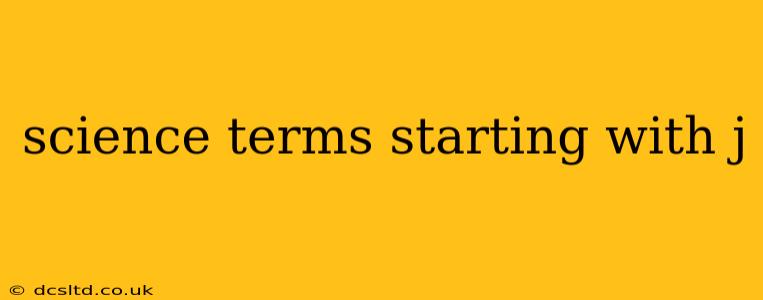Science Terms Starting with J: A Deep Dive into Jargon
The letter J might not be the most prolific letter in scientific terminology, but it's home to some fascinating and crucial concepts across various scientific disciplines. This comprehensive guide delves into a variety of science terms starting with J, explaining their meanings, applications, and relevance. We'll move beyond simple definitions to provide a richer understanding of these terms, answering questions you might have along the way.
What are some common science terms that start with the letter J?
This is a great starting point, and the answer depends heavily on the specific scientific field. However, some frequently encountered terms include:
-
J-coupling: A key concept in nuclear magnetic resonance (NMR) spectroscopy, J-coupling describes the interaction between nuclear spins through chemical bonds. This interaction manifests as splitting of NMR signals, providing invaluable information about molecular structure and connectivity. Understanding J-coupling is critical for chemists analyzing organic molecules, for example.
-
Joule (J): The fundamental unit of energy in the International System of Units (SI). A joule represents the work done when a force of one newton is applied over a distance of one meter. It's used across all areas of physics and engineering, from mechanics to thermodynamics and electricity.
-
Jet Stream: In meteorology, a jet stream is a narrow band of strong winds in the upper atmosphere. These high-altitude air currents significantly influence weather patterns and can impact aviation. Their dynamics are complex and crucial for weather forecasting.
-
J-invariant: Found in algebraic geometry, this is a powerful invariant associated with elliptic curves. It’s a complex topic, crucial for advanced mathematics and theoretical physics exploring concepts like string theory.
What are some less common, but still important, science terms beginning with J?
While the terms above are more frequently encountered, several other J-terms hold significance within specialized scientific niches:
-
Jacobian: In mathematics, specifically calculus, the Jacobian matrix represents the first-order partial derivatives of a vector-valued function. It's crucial for multivariable calculus, transformations, and applications in fields like robotics and computer graphics.
-
J-integral: Used in fracture mechanics, this path-independent integral quantifies the energy release rate during crack propagation in materials. It's critical for assessing the toughness and durability of materials under stress.
-
J-shaped curve: This term often appears in ecological and epidemiological studies, describing a non-linear relationship between two variables where an initial increase is followed by a plateau or even decline. Understanding J-shaped curves is crucial for interpreting data in various fields.
-
Juxtaposition: While not strictly a single scientific term, it's a crucial concept in many scientific disciplines. It refers to the fact of two things being seen or placed close together with contrasting effect. This is particularly important in fields like geology (where different rock types are juxtaposed), biology (cells are arranged in juxtaposition), and even social sciences (studying juxtaposed populations).
What are some science terms starting with J related to biology or medicine?
While fewer prominent terms start with "J" in biology and medicine compared to other letters, we can still highlight some relevant concepts:
-
Junctional Complexes: These cell junctions play critical roles in maintaining tissue integrity and intercellular communication. This includes tight junctions, adherens junctions, desmosomes, and gap junctions.
-
Juxtaglomerular apparatus: This specialized structure in the kidney plays a crucial role in regulating blood pressure through the renin-angiotensin-aldosterone system.
This list isn't exhaustive, as the scientific world is vast and constantly evolving. However, it provides a robust overview of science terms starting with J, exploring both common and less frequently encountered terms across various scientific fields. Remember that the specific relevance of a J-term depends heavily on the context and the scientific discipline being considered.
